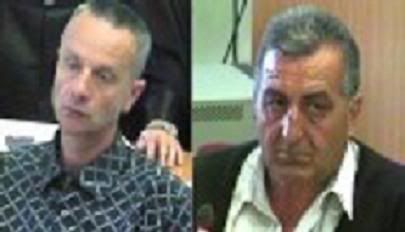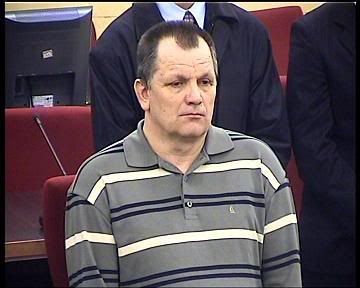SARAJEVO, Bosnia (August 20,2008) - Sarajevo is not a city easily intimidated by the odds. Its citizens withstood a 44 month siege by the genocidal Serbian fascist aggressor that pounded it daily,during the 1992-1995 Serbin aggression against Bosnia,from the surrounding picturesque hills, while the world mostly looked the other way. And even as the snipers and fire bombs continued, the city, like many others around the world, started its own film festival. And again beating the odds, Sarajevo, the capital of Bosnia, has managed to consistently attract big names and an impressive slate of films in a crowded festival circuit. And this in a city,while slowly working its way into modern Europe ,that is is hardly a deep-pocketed shiekdom with money to throw around. Perhaps one of its biggest pluses, however, are its enthusiastic audiences which bring Toronto-sized enthusiasm to screenings.
Not only are the higher profile films well attended, but even relatively unknown titles from lesser known filmmakers have screened consistently well at the 14th Sarajevo Film Festival, even in larger venues during the middle of the work week. An impressive number of people came out early yesterday morning for a discussion on naturalism vs. artifice in film, moderated by former Village Voice film editor (and indieWIRE writer) Howard Feinstein, who programs the festival's large and popular Panorama section.
And the audience was rewarded with a terrific line-up of opinionated filmmakers to hear and interact with. There was a mix of both well-estabished and emerging folks, including Bosnian film director Aida Begic, whose debut feature, "Snow" opened the 14th Sarajevo Film Festival over the weekend with great fanfare. Also joining the discussion was fellow Bosnian film director Danis Tanovic, whose 2001 feature "No Man's Land" won the Oscar for best foreign-language film, "Man on Wire" director James Marsh, "Stranded" director Gonzalo Arijon (Chile), "Jar City" director Baltasar Kormakur and Israeli-German director, Lior Shamriz ("Japan Japan").
"My career started as a student in war," said Tanovic.
"I was in a member of the Bosnian Army and realized nobody was filming. I was never interested in doing documentary...I was into Spielberg, flying dragons etc. But [documentary] is all about risking your life to get the shot, and when I went to film school in Belgium, pure fiction seemed artificial to me..."
With that background, Tanovic formed his style with a documentary background, even in his narrative features, though he is a vocal advocate for approaching the subject with focus and preparation.
"When I did go to do a feature film, it was in a 'documentary' style - something perhaps shown [over the course] of one day. [But] even when you're maing documentaries, you make choices," he said.
Arijon, whose IDFA '07 doc "Stranded" is screening in Sarajevo, said that the subject and the film process itself revealed the route to a finished project. His doc recalls the harrowing survival of plane crash victims in the Andes mountains in the early '70s in which survivors engaged in cannibalism in order to make it through.
"The survivors are my friends, and it was important for me to tell this story, though they were reluctant," said Arijon. With a lack of any footage from the tragic event, Arion decided to not rely heavily on re-enactments to tell the story and relate the horrific event to the audience, using backdrops of a sun-lit sky when interviewing the subjects.
"The natural light inspired the survivors to talk to me, [and it] jarred fragments of their memory. These aren't re-enactments, but the atmosphere recalls the situation from long ago."
"The story I'm telling is true, but it's so unreal," said "Man on Wire"'s James Marsh whose film recalls high-wire artist Philippe Petit's 1974 feat walking the tightrope between the Twin Towers in New York.
"I felt it was important to hae some stylized reconstructions to show how this could occur... It's like a heist story because Philippe had watched police films and that is what inspired him to plan and break into the Twin Towers with all these other goof-balls around him. I think that's why I think it works in America because it recalls superheroes like Batman, but it's real. He's sort of a superhero doing this and it's subversive at the same time."
Balancing re-enactment and how much to bring the director's point-of-view in filmmaking naturally made for some lively discussion during the panel, which was an event planned for Sarajevo's Talent Campus participants but open to the press and public.
"In 'Snow,' it is a combination of documentary-style with [articism], to achieve a poetic film that is also naturalistic," said Aida Begic. "The camera [was held] on the shoulder so as to [bring out] what's inside the character."
"Any art is a metaphor and should be a balance between naturalism and artifice... It's dangerous to go too far into naturalism as in the Dogma movement or too far in artifice as in 'Amelie.' There's a constant struggle between [both]."
"The camera is a window to reality, that's quite basic to cinema," said "Japan Japan"'s Lior Sharmiz.
"Before I did cinema, I learned to manipulate pictures and they seemed as real to me as all other pictures... I take a 'documentary' of reality and then manipulate it. I can shoot something that doesn't seem realistic but appears so..." he said.
Tanovic chimed in that a laissez faire vs. strict top down construction of a story can both work, but sees barriers.
"I agree and disagree... I'm a total control freak. There are scenes you can improvise, but only when you come totally prepared with your vision. It's like 'boxes.' The actor and the cameraman can dow what they want within that box, but if they go outside the box [I invision] then I bring them back in," Tanovic said.
Shamriz countered Tanovic's approach saying he prefers a more democratic collaborative process with people in his work and the outcome can take on an entirely new result.
"'Japan Japan' is partly autobiographical, but partly isn't," he said about the finished product which uses a hodge podge of scenes of reality and images from the Internet to tell the story of a disaffected former Israeli soldier's quest to find meaning, but lapses in a personal void that seems to stagnate him. "For me the camera is not valid. Most of the images I see are on the Internet."
Though Tanovic argued the filmmaker's control was always present and important he conceded the filmmaking approach is nevertheless left wide open. "In the end there are [ultimately] no rules. You have to find your own approach," Tanovic concluded.
.
 SARAJEVO, Bosnia (August 20,2008) - According to the decision of Bosnian government, the Bosnian Foreign Investment and Promotion Agency (FIPA) is appointed to be a technical organizer of the next Crans Montana Forum (CMF).
SARAJEVO, Bosnia (August 20,2008) - According to the decision of Bosnian government, the Bosnian Foreign Investment and Promotion Agency (FIPA) is appointed to be a technical organizer of the next Crans Montana Forum (CMF).







